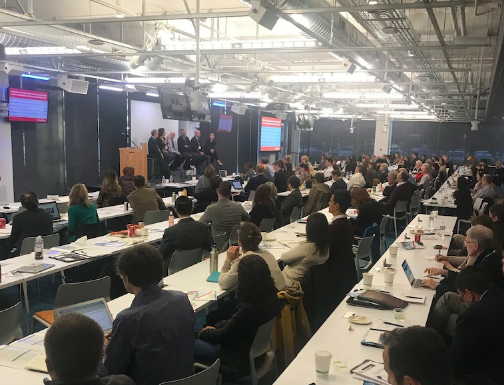- Facebook144
- Threads
- Bluesky
- Total 144

(Menlo Park, CA) Here I am at Facebook, posting on Facebook. I’m with about 160 other people, and we’re having a valuable conversation about how to measure and assess civic education. (The space is leant to us by Facebook, but the organizers, CivXNow, are fully independent from Facebook.)
The participants bring highly diverse expertise, professional backgrounds, and opinions of relevant topics–from the nature of a good citizen to the appropriate role of testing. They are somewhat diverse racially and culturally, but much less so than the nation or our nation’s students. They are the kinds of people who can get their flights to California reimbursed from an organization’s budget, who can put titles on their name tags, and who can be asked to address specific issues as experts. Even if they perfectly represented America’s students and parents in terms of race and ethnicity, they would be sociologically different. This is a slice of the professional class.
Speakers have named that problem, as they should. Any group concerned with enhancing democracy should ask whether it is operating democratically. Democratic values include representation, voice, and accountability. If a bunch of adults with titles on their name tags talk about kids, they do not represent youth, give youth voice, or make themselves accountable to youth.
But I think it’s important to be realistic about the challenge. A defining feature of modernity–possibly the defining feature–is specialization. In socialist and capitalist societies alike, roles are differentiated and assigned to people who demonstrate and build specialized experience and training over years. Per Wikipedia, Max Weber’s definition of a “bureaucracy” is:
- hierarchical organization
- formal lines of authority
- a fixed area of activity
- rigid division of labor
- regular and continuous execution of assigned tasks
- all decisions and powers specified and restricted by regulations
- officials with expert training in their fields
- career advancement dependent on technical qualifications
- qualifications evaluated by organizational rules, not individuals
Some successful organizations avoid the narrowest versions of these characteristics. For instance, they don’t divide tasks too “rigidly.” But they all do some of the above, and for an important reason: it works. Specialization, formal lines of authority, expertise and training all improve efficiency.
Because bureaucracy (within appropriate limits) boosts efficiency, it also confers power. People in organizations are more powerful than amorphous masses of people. A conference of representatives of organizations has more influence than a gathering of representative citizens would have. Apart from anything else, it can interlock with other bureaucratic systems, from state agencies to Facebook. But it must be demographically unrepresentative of the people it intends to help, at least in terms of age, employment, and educational attainment. Maybe Robert Michels exaggerated when he observed an Iron Law of Oligarchy, but if it’s not a law, it’s a strong tendency.
There is also power in grassroots politics, social movements, mass meetings, viral media campaigns, and the like. In fact, the people can swamp a Weberian bureaucracy. But popular politics is very different from organizational networking.
At our best, I think we can blur some of these boundaries. (For instance, there are a few eloquent and impressive k-12 students at this meeting.) We can cross boundaries in our own lives and careers, spending some time in settings where we are not experts or leaders, even if we wear name tags with impressive titles in other settings. We can morph from organizations to movements and back. And we can develop new methods for engaging grassroots publics in our organizations’ work. (This survey is an example.) But we shouldn’t kid ourselves that social change occurs without organizations or that organizational leaders can be truly representative of the public.
See also: who must be included in which meetings, committees, and movements?; Nicole Doerr, Political Translation: How Social Movement Democracies Survive; the rise of an expert class and its implications for democracy; and what gives some research methods legitimacy?